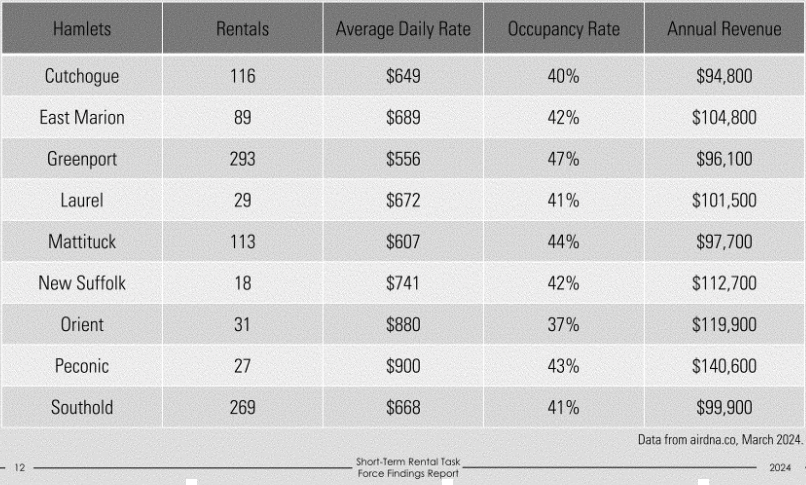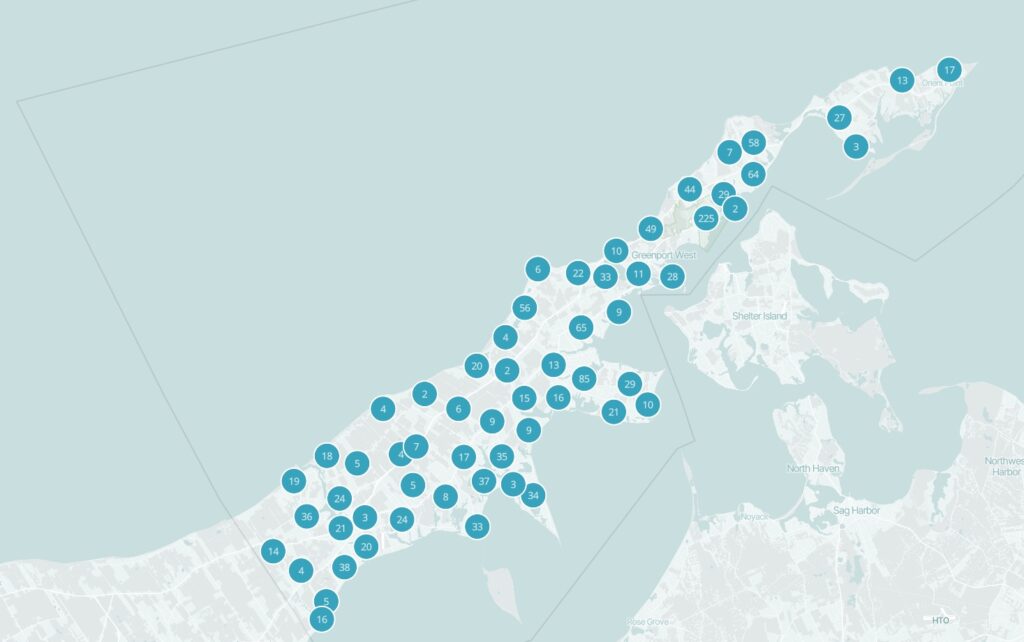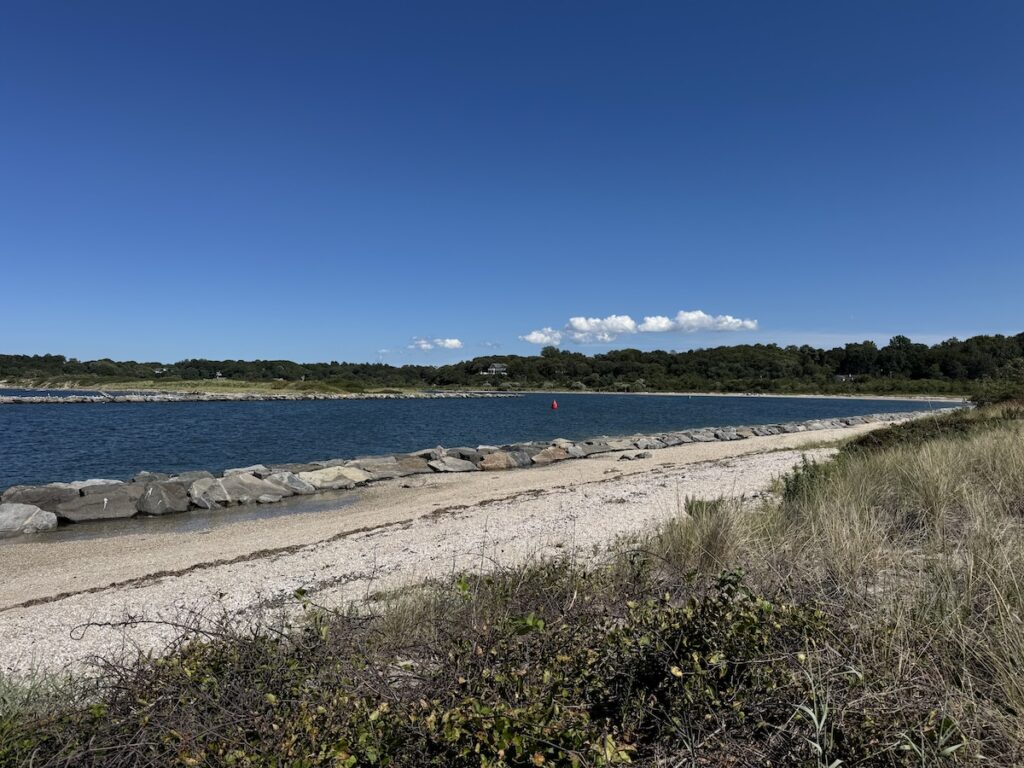Southold letters to target transient rental violations

AirBnBs, Vrbos and other short-term rentals in Southold can be a sore subject for North Fork residents who struggle to find housing in the township with limited inventory.
The properties can sit vacant for long periods during the colder months, leaving the afternoon stroller to count the number of homes on their block without neighbors until summer rolls around again.
The short-term rentals are an $11 million annual enterprise in Southold — one that brings visitors to local vineyards, farms and businesses in the community. The properties provide a lodging inventory in a town that just extended its moratorium on hotel development for a second year.

According to the town’s Short-Term Rental Task Force’s 2024 findings presentation, short-term rentals in the township rake in between $94,800 and $140,600 each annually.
Roughly 1,500 homes in the town have been reported as short-term rental properties, but assistant town attorney Ben Johnson said a smaller number have violated the town’s short-term rental laws. He noted that enforcement and penalties for transient rental violations have increased exponentially in the last three years.
The short-term rental problem is an issue the Task Force and Town Board have looked to address for some time now. This summer, Mr. Johnson said the town will send letters out to known violators to educate them on the transient rental laws in Southold in an effort to drive compliance.
Property owners must apply to town code enforcement for a rental permit with a minimum of 14 nights per stay — meaning they cannot legally be rented out for a weekend or handful of days. Mr. Johnson noted that permits do not explicitly distinguish the rental period time beyond the minimum-stay stipulation.
AirBnB hosts can find a rules page on the company’s website for more information about rental permits in Southold.
The letter campaign would come in three waves, Mr. Johnson said. The first letter would be more informative, letting property owners know how they can comply with town code. The second letter would take a more “stern” tone for homeowners who have continued to violate the regulations. The third would be a final warning sent for violators who are not in compliance with town code after the first two letters.
“We’re hoping to achieve voluntary compliance through informing these people through this letter campaign,” Mr. Johnson said.
Under Chapter 207-7 of the town code, Mr. Johnson said the law can be interpreted to issue violations for renters who stay at a property without a rental permit.
First-time violations of Chapter 207, if convicted, are punishable by a $3,000 to $10,000 fine or a maximum imprisonment of 15 days. A second violation conviction within five years is punishable by a $5,000 to $20,000 fine and revocation of the rental permit or a maximum imprisonment of 15 days.
Code enforcement officers have not been issuing tickets to renters, but Mr. Johnson said the town could issue tickets as a means to have unknowing renters testify against homeowners who are violating the law.
“I don’t think … it’s the intention of our office to punish tourists,” Mr. Johnson said. “But rather [to] really just figure out a way to better prove that [the renters] were in this house. They spent this much money there. They were there from Friday to Sunday. It is not their home; they rented it and they left.”
The tickets for tourists could help town attorneys prove that property owners are violating the town code. A decision to pursue tickets against short-term renters would ultimately have to be made by the Town Board, Mr. Johnson said.
“They’re violating the code here, and there’s a real impact on the community,” Town Councilman Greg Doroski said during a May 28 Town Board work session discussing the matter.
The Town Board said it is working on an update to the short-term rental code in the town to be proposed in September. Town Supervisor Al Krupski said the code would be subject to community input at a public hearing in the future.
“It’s very disruptive for a neighborhood,” Mr. Krupski said of short-term rentals. “And we’ve had numerous complaints of course, over the last few years, about the impact if you live next to someone who’s renting their house short term.”
He noted that commercial and business properties have to go through the motions to earn site plan approval, “and none of this takes place in a residential property; and it is a business.”
The town started using Rentalscape — a database tool made by Deckard Technologies that compiles information about local real estate data, vacation rental permits and booking activity with its software — in May to decipher what properties are violating town code.
Southold Town Board allotted $30,000 from the 2024 budget year to use the software after a program of its caliber was recommended by the Task Force. Mr. Johnson said the town will spend $20,000 on the program in the 2025 fiscal year as it has not been able to utilize all of its services just yet.
“[The short-term rentals are] so rampant that we have the ability now to see where this is happening,” Mr. Johnson said. “And it’s happening in numbers all over town that are quite staggering.”

The program has identified more than 400 properties that have currently or recently had bookings of less than 14 nights, a violation of the town code.
Rentalscape identifies properties by screening the internet for property owners’ names, their primary address for citations, the advertising rate for each house and the duration and frequency of each renter’s stay. It also identifies which properties are not paying the Suffolk County transient occupancy tax, Mr. Johnson said.
Mr. Johnson said the program has allowed code enforcement officers to identify violations from their desk. Typically, Mr. Johnson said complaints come into the code enforcement system, and then code enforcement officers visit the property and evaluate any violations.
“We’re still training our code enforcement officers how to use it, and we’re still really figuring out how this is going to be something that helps drive compliance,” Mr. Johnson said.









